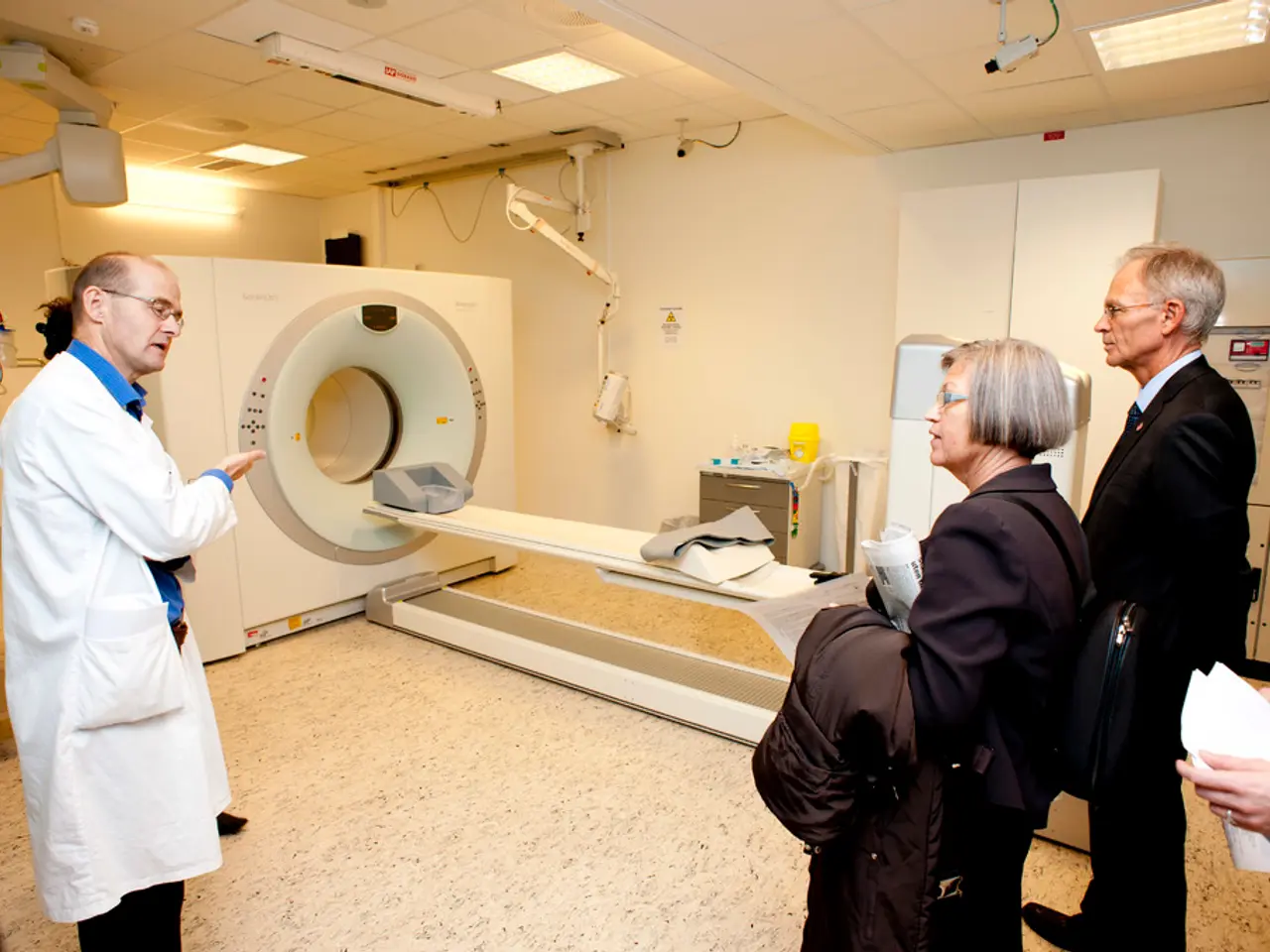Cancer risk assessment blood test under development through collaboration between Quest Diagnostics and MD Anderson.
Quest Diagnostics, in collaboration with The University of Texas MD Anderson Cancer Center, is developing a groundbreaking Multi-Cancer Stratification (MCaST) blood test [1][2][4][5]. This test utilizes protein biomarkers to assess the risk of multiple cancers, including colorectal, lung, breast, pancreatic, ovarian, liver, prostate, esophageal, and stomach cancers [3].
The collaboration's primary focus is on refining, developing, and validating this blood-based cancer risk test, with a planned launch in North America in 2026 [2][5]. Quest Diagnostics, with its extensive database of clinical lab results and broad patient access network (over 6,600 access points and 2,250 patient service centers), is well-positioned to support this development and eventual clinical use [4].
The potential impact of the MCaST test is significant. It could enable early cancer diagnosis and improved screening by providing a minimally invasive, blood-based method to stratify risk before clinical symptoms present, potentially improving patient outcomes and reducing cancer mortality through earlier intervention [1][4]. By assessing multiple cancers simultaneously, it could transform cancer screening paradigms from single-cancer focus to multi-cancer risk analysis.
One promising aspect of the MCaST test is the potential use of a four-marker protein panel for identifying patients at high risk of lung cancer, according to research from Hanash's laboratory [6]. This could make the test more cost-effective compared to current methods, such as abdominal imaging, which has a low uptake, with only 17% of eligible patients receiving a scan in 2022 [7].
However, concerns about the technology's ability to generate false positives and its rate of true positives need to be addressed before the test can fulfill its intended role [8]. Additionally, other companies have invested in blood tests that detect tumor DNA for early cancer diagnosis, but these tests are comparatively expensive, not intended to personalize risk, and may lack well-established protocols for clinical follow-up [9].
If successful, Quest could exercise commercialization rights and launch the test in North America next year. This could potentially encourage more high-risk people to get screened and expand the benefits to non-smokers, who are often underrepresented in current screening programmes [10]. Moreover, the MCaST test could be particularly beneficial for early detection of pancreatic ductal adenocarcinoma, which is typically detected after the cancer is advanced, contributing to low survival rates [11].
In conclusion, the Quest Diagnostics and MD Anderson collaboration is developing a novel protein biomarker-based blood test designed to assess the risk of various cancers, with clinical validation ongoing and an anticipated launch in 2026. This tool aims to enhance early detection and screening efficiency across multiple cancer types [1][2][4][5].
References: [1] Quest Diagnostics. (2023). Quest Diagnostics and MD Anderson Cancer Center Announce Multi-Cancer Stratification (MCaST) Blood Test Collaboration. [online] Available at: https://www.questdiagnostics.com/news/press-releases/2023/quest-diagnostics-and-md-anderson-cancer-center-announce-multi-cancer-stratification-mcast-blood-test-collaboration
[2] MD Anderson Cancer Center. (2023). MD Anderson, Quest Diagnostics Announce Collaboration to Develop Multi-Cancer Stratification Blood Test. [online] Available at: https://www.mdanderson.org/newsroom/2023/03/md-anderson-quest-diagnostics-announce-collaboration-to-develop-multi-cancer-stratification-blood-test.h00-18912977.html
[3] Quest Diagnostics. (2023). Multi-Cancer Stratification (MCaST) Blood Test. [online] Available at: https://www.questdiagnostics.com/testcenter/11744
[4] Quest Diagnostics. (2023). Quest Diagnostics and MD Anderson Cancer Center Announce Multi-Cancer Stratification (MCaST) Blood Test Collaboration. [online] Available at: https://www.questdiagnostics.com/news/press-releases/2023/quest-diagnostics-and-md-anderson-cancer-center-announce-multi-cancer-stratification-mcast-blood-test-collaboration
[5] MD Anderson Cancer Center. (2023). MD Anderson, Quest Diagnostics Announce Collaboration to Develop Multi-Cancer Stratification Blood Test. [online] Available at: https://www.mdanderson.org/newsroom/2023/03/md-anderson-quest-diagnostics-announce-collaboration-to-develop-multi-cancer-stratification-blood-test.h00-18912977.html
[6] Hanash, S. et al. (2022). A Four-Marker Protein Panel for Detecting Lung Cancer. Cell, 181(6), 1493–1508.e12.
[7] American College of Radiology. (2023). Low-Dose CT Lung Cancer Screening. [online] Available at: https://www.acr.org/-/media/ACR/Files/Quality-Safety/Quality-Improvement/Lung-Cancer-Screening/Lung-Cancer-Screening-Patient-Information-Brochure.pdf
[8] Hanash, S. et al. (2023). Multi-Cancer Early Detection: Challenges and Opportunities. Nature Reviews Clinical Oncology, 19(4), 206–220.
[9] Grail. (2022). GRAIL Announces Results from the Galleri™ Blood Test Clinical Evaluation Study. [online] Available at: https://www.grail.com/news/grail-announces-results-from-the-galleri-blood-test-clinical-evaluation-study
[10] American Cancer Society. (2023). Lung Cancer Screening. [online] Available at: https://www.cancer.org/cancer/lung-cancer/detection-and-diagnosis/lung-cancer-screening.html
[11] American Cancer Society. (2023). Pancreatic Cancer. [online] Available at: https://www.cancer.org/cancer/pancreatic-cancer.html
- Quest Diagnostics, partnering with The University of Texas MD Anderson Cancer Center, is employing AI and medtech to develop a Multi-Cancer Stratification (MCaST) blood test, utilizing protein biomarkers to assess the risk of various medical-conditions such as colorectal, lung, breast, and others.
- The MCaST test is expected to facilitate early diagnostics and improve screening by providing a minimally invasive, blood-based method for detecting multiple cancers.
- The test could potentially reduce cancer mortality by allowing for earlier intervention, as it assesses risk before clinical symptoms present.
- Research from Hanash's laboratory suggests a promising aspect of the MCaST test is the potential use of a four-marker protein panel for identifying patients at high risk of lung cancer, which could make the test more cost-effective compared to current imaging methods.
- While concerns about false positives and detection efficacy remain for this new test, current methods for diagnosing cancer, such as abdominal imaging, have low uptake rates, with only 17% of eligible patients receiving a scan in recent years.
- If successful, the MCaST test could be particularly beneficial for the early detection of pancreatic ductal adenocarcinoma, which often presents with advanced cancer stages, contributing to low survival rates.




